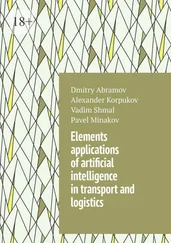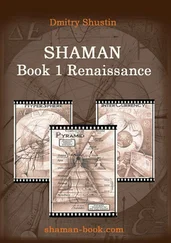‘He doesn’t want to kill anyone!’ she said in a shrill voice that was much too loud.
‘Oh, right, it’s just his job, that’s all…’ He sighed. ‘And who am I to judge him?’
‘And what are you going to do?’ asked Sasha, not attempting to conceal her scorn. ‘Play your flute?’
‘I’m just going to be with you,’ Leonid said with a smile. ‘What else do I need for happiness?’
‘You’re just saying that,’ said Sasha, shaking her head. ‘You don’t even know me at all. How can I make you happy?’
‘There are ways. Just to look at a beautiful girl is enough to improve my mood. And then…’
‘Do you think you know about beauty?’ she asked, squinting sideways at him.
‘It’s the only thing I do know anything about,’ he said with a solemn nod.
‘So what’s so special about me?’ she asked and the wrinkles on her forehead smoothed out at last.
‘It’s the way you just glow!’
His voice sounded serious, but an instant later the musician dropped back a step and ran his eyes over her.
‘It’s just a pity you like such crude clothes,’ he added.
‘What’s wrong with them?’ she asked, also dropping back, in order to detach his ticklish gaze from her back.
‘They don’t let the light through. And I’m like a moth… I always fly towards the flame,’ he said, fluttering his hands with a deliberately foolish air.
‘Are you afraid of the dark?’ she asked, accepting the game.
‘Loneliness!’ Leonid put on a mask of sadness and folded his arms.
That was his mistake. As he tuned the strings, he misjudged the resistance, and the finest one, the most delicate, which might have started to sing in just another moment, twanged and snapped.
The light tunnel draught, which had blown away Sasha’s serious thoughts and made her juggle with the musician’s playful hints, instantly died away. She sobered up and rebuked herself for giving way to him. Surely it wasn’t for this that she had abandoned Hunter and left the old man behind?
‘As if you even knew what that is,’ Sasha snapped and turned away.
Serpukhov Station, pale-grey from fear, was dissolving into the darkness. Soldiers in army gas masks had cut it off from the tunnels at both sides and blocked the connecting passage to the Circle Line, and the station was buzzing like a disturbed beehive in anticipation of disaster. Hunter and Homer were led through the hall with an armed escort, like high-ranking officers, and every inhabitant of Serpukhov tried to look into their eyes, to see if they knew what was really happening and if their fate had been decided. Homer stared fixedly at the floor – he didn’t want to remember those faces.
The brigadier hadn’t informed Homer where he intended to go next, but the old man could guess. Ahead of them lay Polis. Four Metro stations, linked together by passages, a genuine city with thousands of inhabitants. The unofficial capital of the Metro, which was fractured into dozens of warring feudal principalities. A bulwark of science and refuge of culture. A holy sanctuary that no one dared to invade or attack. No one, that is, apart from Homer, the half-crazy messenger of the plague.
But in the last few days he had started feeling better. The nausea had receded, and the consumptive cough that forced him to wash out his bloody respirator had softened a little. Maybe his body had overcome the illness on its own? Or maybe there never was any infection at all? Eh? Maybe he was simply too neurotic about his health; he’d always known he had that tendency, but he had still got so terrified…
The stretch of tunnel beyond Serpukhov was dark and remote, it had a bad reputation. As far as Homer was aware, they shouldn’t encounter a single soul until they reached Polis, but Polyanka, the way station between inhabited Serpukhov and residential Borovitskaya, could surprise travellers. There were numerous legends about Polyanka Station circulating in the Metro: if they could be believed, this station rarely threatened the lives of those who walked through it, but it could damage their reason.
The old man had been here several times, but never encountered anything out of the ordinary. The legends had explanations for that too, Homer knew all of them. And now he was hoping as hard as he could that this time the station would remain as dead and abandoned as it had been in better times.
About a hundred metres before Polyanka he suddenly felt strange. With the first distant glints of white electric light on the station’s marble walls, and the first echo of fractured sounds coming from it, the old man suspected something was wrong. He could clearly hear human voices… And there was no way that could be right. Even worse, Hunter, who in some mysterious way could sense the presence of any living creatures, remained absolutely deaf and indifferent now.
Completely absorbed in his own thoughts, he didn’t respond to the old man’s agitated glances, as if he couldn’t see the visions being revealed to Homer at that moment… The station was occupied? When had they done that? Homer had often wondered why, despite Polyanka’s cramped space, the inhabitants of Polis had never tried to annex and develop the empty station. There was nothing to prevent it but the superstitions – but apparently they had proved a sufficiently weighty reason for this strange way station to be left in peace.
Until, that is, someone overcame their fear of it and set up a tent town here, put in lighting… God, how extravagant they were with electric power here! Even before the two travellers emerged from the tunnel and started walking along beside the platform, the old man had to put his hand over his eyes to avoid being blinded: bright mercury lamps were glaring at full power up under the ceiling of the station.
Astounding… Not even Polis looked so clean and festive. Not a trace of dust or soot was left on the walls, and the marble slabs all gleamed, while the ceiling looked as if it had been whitewashed only yesterday. Homer couldn’t spot a single tent through the arches – perhaps they hadn’t had time to put them up yet? Or perhaps they were going to make a museum here? That would be just like the eccentric cranks who ran Polis.
The platform gradually filled up with people. They took no interest at all in the cutthroat wearing a titanium helmet who was hung all over with weapons, or the grubby old man hobbling along beside him. Looking closely at them, Homer realised that he didn’t have the strength to take another step: his legs had given out.
Everyone who came over to the edge of the platform was dressed up as if someone was shooting a film about the 2000s at Polyanka. Brand new coats and raincoats, bright-coloured down jackets, sky-blue jeans… Where were the old padded jackets, where was the lousy pigskin leather, where was the perpetual reddish-brown of the Metro, the graveyard of all colours? Where had all this wealth come from?
And the faces… They weren’t the faces of people who had lost their entire family in a single moment. They were the faces of people who had seen the sun today and who, well, basically, had started the day with a hot shower. The old man would have bet his life on that. And something else… Many of them seemed vaguely familiar to Homer.
More and more of these incredible people appeared, jostling at the edge of the platform, but they didn’t get down onto the tracks. Soon the entire station was filled from tunnel to tunnel with the trim, dressy crowd. And still no one looked at Homer. They looked anywhere at all – at the wall, at newspapers, at each other – surreptitiously, lugubriously or curiously, with loathing or sympathy – but not at the old man, as if he were a ghost.
Why had they gathered here? What were they waiting for?
Читать дальше











